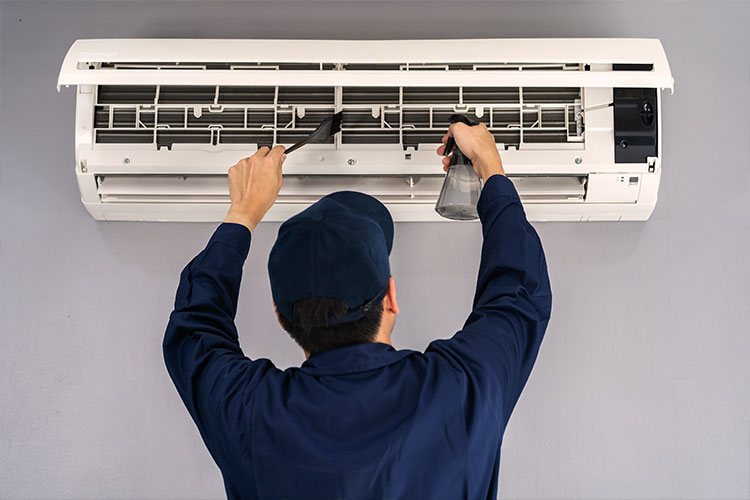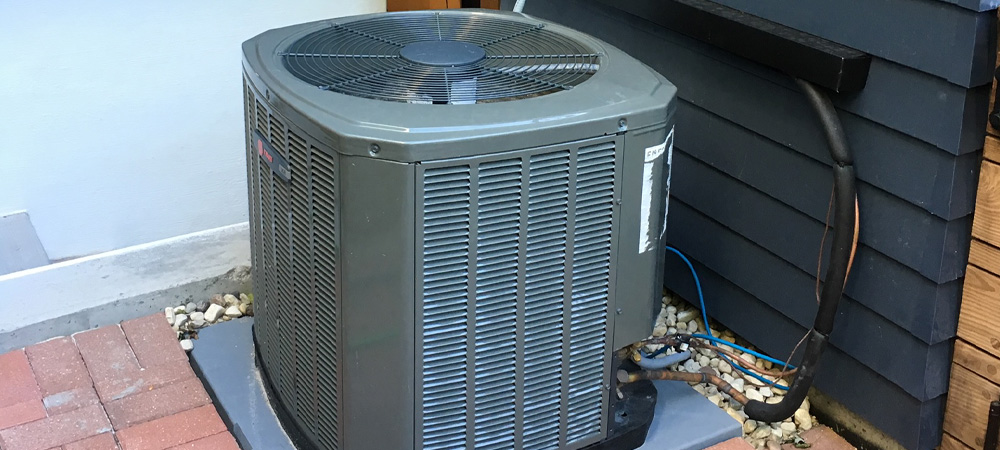Little Known Facts About Ac Repair.
Little Known Facts About Ac Repair.
Blog Article
Ac Repairing: Repair Work The Cooling System To Restore Comfy Indoor Temperatures
Identifying Common Air Conditioning Unit Issues
Ever found yourself sweltering in the middle of a heatwave, just to realize your air conditioning system isn't cooling as it should? It's aggravating, but more typical than you may believe. Numerous homeowners face these problems annual, from unusual sounds to irregular airflow. Why does this occur?
Top Issues That Typically Pop Up
- Refrigerant Leaks: When the cooling representative leakages, the AC struggles to chill the air, leaving you with hot blasts rather of rejuvenating breezes.
- Frozen Evaporator Coils: Ever discovered ice accumulation? It's a sign the system's working overtime or air flow is blocked.
- Clogged Air Filters: Dust and particles can choke the system, causing it to labor more difficult and potentially get too hot.
- Faulty Thermostat: Often, the perpetrator is as basic as a misreading thermostat, sending incorrect signals to your system.
- Drain Problems: Water pooling around the system? Obstructed drain lines may be the sly bad guy here.
How to Acknowledge These Issues Early
Is your a/c making odd sounds-- a grinding or rattling? That's a red flag. Or has your electrical expense inexplicably increased without a change in usage? Ineffectiveness frequently hides behind such ideas.

| Symptom | Possible Cause | Quick Fix Suggestion |
|---|---|---|
| Warm air blowing | Low refrigerant or compressor failure | Examine refrigerant levels; call an expert for compressor issues |
| System won't switch on | Electrical issues or thermostat breakdown | Reset breaker; replace thermostat batteries |
| Water leakage | Blocked drain line | Clear drain with a wet/dry vacuum |
Why Do These Problems Happen?
Think about your a/c as a fragile environment. Disrupt one part, and the entire system stumbles. Often, it's neglect-- a forgotten filter change-- or external factors like power rises. What's clear is that overlooking early signs only turns small glitches into significant headaches.
Essential Tools for AC Repair
Ever discovered yourself staring at a frozen evaporator coil or a persistent compressor that refuses to hum back to life? You'll rapidly understand that having the right tools isn't simply a benefit-- it's a need. Think of trying to gauge refrigerant pressure with a damaged gauge or patching a leak without a proper air pump. The disappointment is genuine, but the solution lies in preparation.
Core Tools Every Professional Need To Have

- Manifold Gauge Set: For precise measurement of refrigerant pressures-- this is your diagnostic compass.
- Air pump: Eliminating moisture and air from the system is crucial; skipping this step risks contamination.
- Multimeter: Electricity flows quietly, but a multimeter speaks volumes about voltage, existing, and continuity.
- Fin Comb: Bent fins on the condenser can choke air flow. This easy tool restores airflow efficiency rapidly.
- Refrigerant Leak Detector: Pinpoint elusive leakages that might otherwise fly under the radar.
Pro Tips for Utilizing Your Tools
- Never ever connect gauges without first confirming the system is off. It prevents damage to your instruments and safeguards your fingers.
- When using the vacuum pump, run it for a minimum of 30 minutes to guarantee all wetness is extracted-- faster ways here result in system failure.
- Adjust your multimeter routinely; even minor mistakes can misguide troubleshooting efforts.
- Utilize the fin comb carefully; excessive force can trigger more damage.
What's typically ignored is how these tools interaction. A refrigerant leakage detector guides where to link your manifold assesses to examine pressure drops precisely. Have you ever saw how a basic tool swap can shave hours off a repair job? That's the type of efficiency every professional yearns for.
Step-by-Step Repair Work Instructions for Your Air Conditioning System
Ever stood sweating while looking at a persistent air conditioning system that refuses to cool? The buzzing hum that unexpectedly becomes silence can be maddening. How do you even start to untangle this web of mechanical wrongdoing? Let's cut through the confusion with a clear, expert-guided procedure.
1. Diagnose the Core Issue
Before diving into repair work, ask: is the problem electrical, mechanical, or refrigerant-related? A quick test-- switch off the system and examine the circuit breaker. Tripped breakers frequently conceal the root cause. Next, inspect the thermostat settings. In some cases, the repair is as simple as more info recalibrating your thermostat or replacing its batteries.
2. Examine the Air Filter and Coils
A clogged up filter or unclean coils can choke your air conditioning unit's efficiency. Pull out the filter:
- If it looks filthy or dusty, swap it instantly.
- Utilize a vacuum or soft brush to clean the evaporator coils carefully.
Keep in mind, an overlooked filter is like attempting to breathe through a scarf in a sauna-- inadequate and frustrating.
3. Examine the Condensate Drain
Obstructed drains pipes lead to water accumulation, activating sensing unit shutdowns. Use a stiff wire or a wet/dry vacuum to clear the drain line. This quick repair avoids leakages that can cause bigger headaches.
4. Test the Capacitor and Fan Motor
These elements often stop working calmly. Using a multimeter, inspect the capacitor for voltage consistency. If readings fluctuate wildly or check out no, replacement is in order. For the fan motor, listen for grinding or irregular spinning-- indications of imminent failure.
Quick Reference Table: Common Symptoms and Fixes
| Symptom | Probable Cause | Specialist Tip |
|---|---|---|
| Air conditioner not cooling | Dirty filter or low refrigerant | Tidy filter initially; look for leakages with soapy water |
| Unit will not start | Tripped breaker or defective capacitor | Reset breaker; test capacitor with multimeter |
| Water leaking inside | Obstructed condensate drain | Clear drain line to avoid overflow |
Now, you might wonder, "Is it truly worth attempting to repair this myself?" Consider this: lots of repair work hinge on perseverance and the right tools rather than raw technical skill. A consistent hand and a bit of troubleshooting can save hours and dollars. As with any detailed machine, the key depend on understanding its language-- the hums, clicks, and silences-- and reacting accordingly.
Unlocking Durability: Preventive Maintenance Tips for AC Units
Ever seen how a whispering breeze can develop into a stifling heating system when your a/c unit fails? That subtle hum is typically the first indication of hidden strain. Overlooking these whispers can lead to a complete breakdown just when you need cool relief the most. But what if you could capture these early whisperings before they escalate?
Start with the filter. It's simple to ignore, yet a clogged filter chokes air flow, forcing your unit to work overtime and spike energy consumption. Changing or cleaning up filters every one month throughout peak use isn't just excellent practice; it's a lifesaver for your air conditioner's effectiveness.
Secret Preventive Steps:
- Inspect the coils: Dirt build-up on evaporator and condenser coils decreases heat absorption and release. A gentle brush or vacuum can restore their pristine condition.
- Clear the condensate drain: Blockages here can cause water damage and boost indoor humidity. An easy wire or compressed air blast can keep this course clear.
- Check refrigerant levels: Too low, and your air conditioning pressures to cool; too expensive, and it risks compressor damage. Just licensed specialists need to manage refrigerant adjustments.
- Evaluate the thermostat's precision to avoid unneeded cycling or discomfort.
Keep in mind the story of the old unit that froze solid one summer? The culprit was a small leak that sneaked previous unnoticed. Little concerns typically imitate typical wear but compound quickly. Staying ahead with regular assessments and seasonal tune-ups can avoid these hidden disruptions.
| Maintenance Job | Frequency | Effect |
|---|---|---|
| Filter Replacement | Every one month | Enhances airflow and decreases strain |
| Coil Cleaning | Every year | Improves heat exchange effectiveness |
| Drain Cleaning | Quarterly | Prevents water damage and mold growth |
| Refrigerant Examine | Each year | Makes sure optimum cooling performance |
Isn't it curious how the tiniest tweaks-- like tightening loose electrical connections or lubing moving parts-- can spin your AC back to peak kind? These aren't simply repairs; they're financial investments in convenience. A well-kept system doesn't just cool; it whispers cool tranquility, even in the most blistering heat.
Air Conditioning Replacement [:location]Air Conditioning Repair Service [:location]
Air Conditioning And Heating [:location]
Air Conditioning Repair Orida [:location]
What Is The Best Heating And Air Conditioning [:location]
Air Conditioning Unit Repair Work Providers in Jacksonville, FL
Jacksonville, FL, is a lively city known for its comprehensive park system, gorgeous beaches, and busy cultural scene. As the most populous city in Florida, it provides a varied series of outdoor activities consisting of fishing, boating, and checking out the Timucuan Ecological and Historic Preserve. The city's warm environment makes air conditioning a crucial part of everyday comfort for residents and companies alike.
For those requiring to repair air conditioning unit, Bold City Heating and Air provides skilled consultation and advice. They are ready to assist guarantee your cooling system runs effectively through Jacksonville's hot seasons. Connect to them for a totally free assessment to resolve your cooling repair work requirements.
Report this page